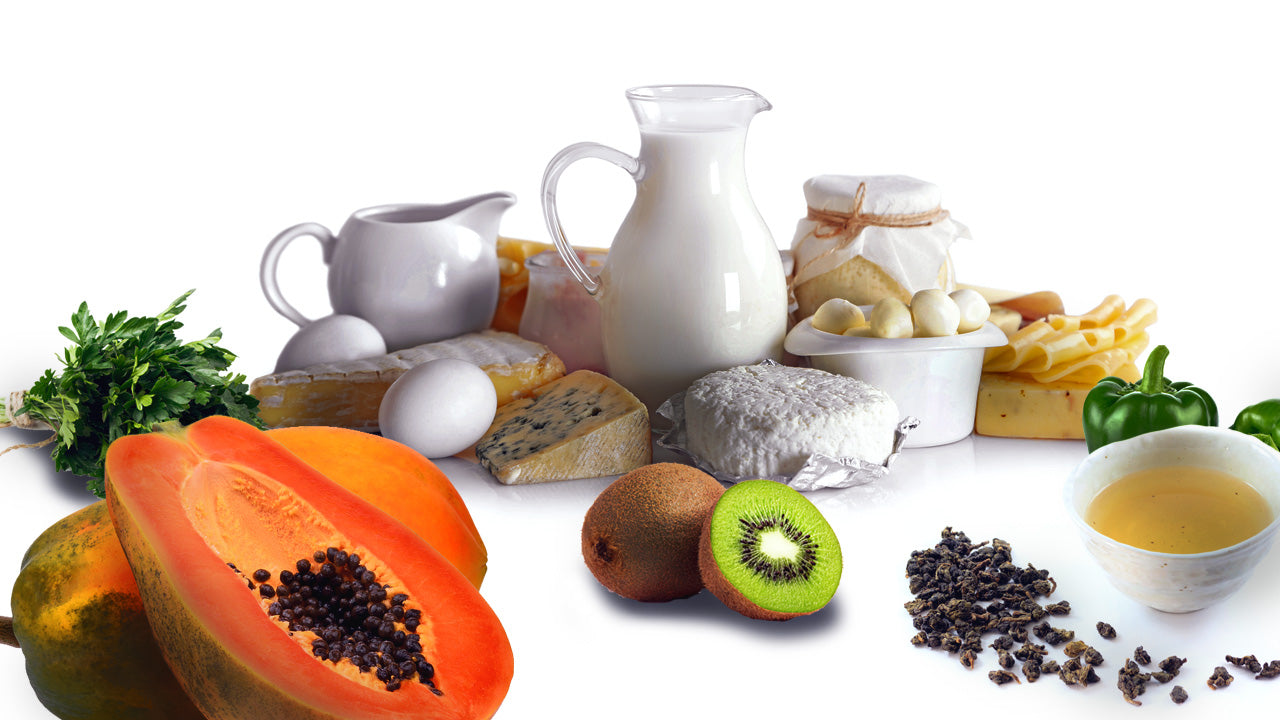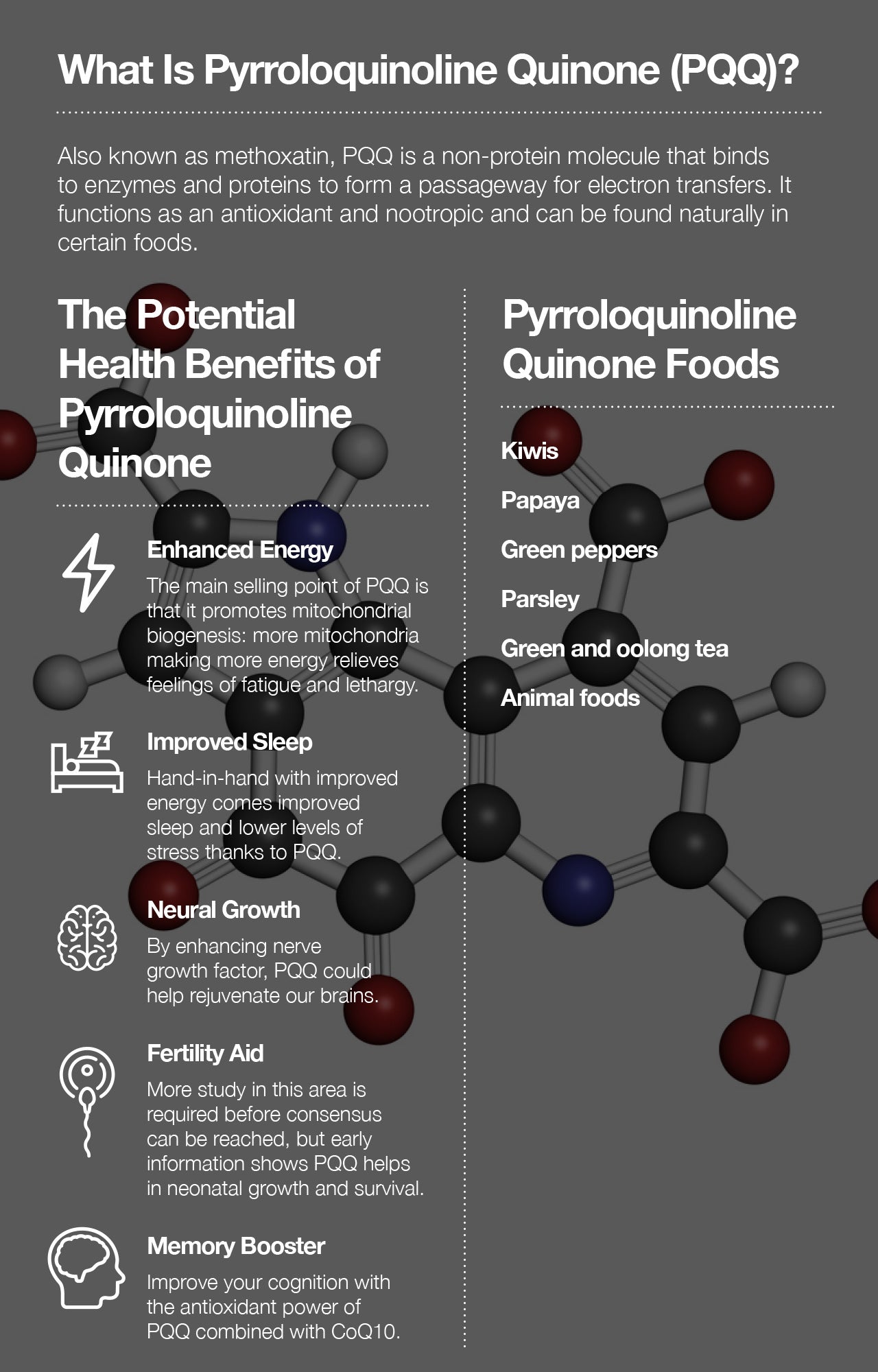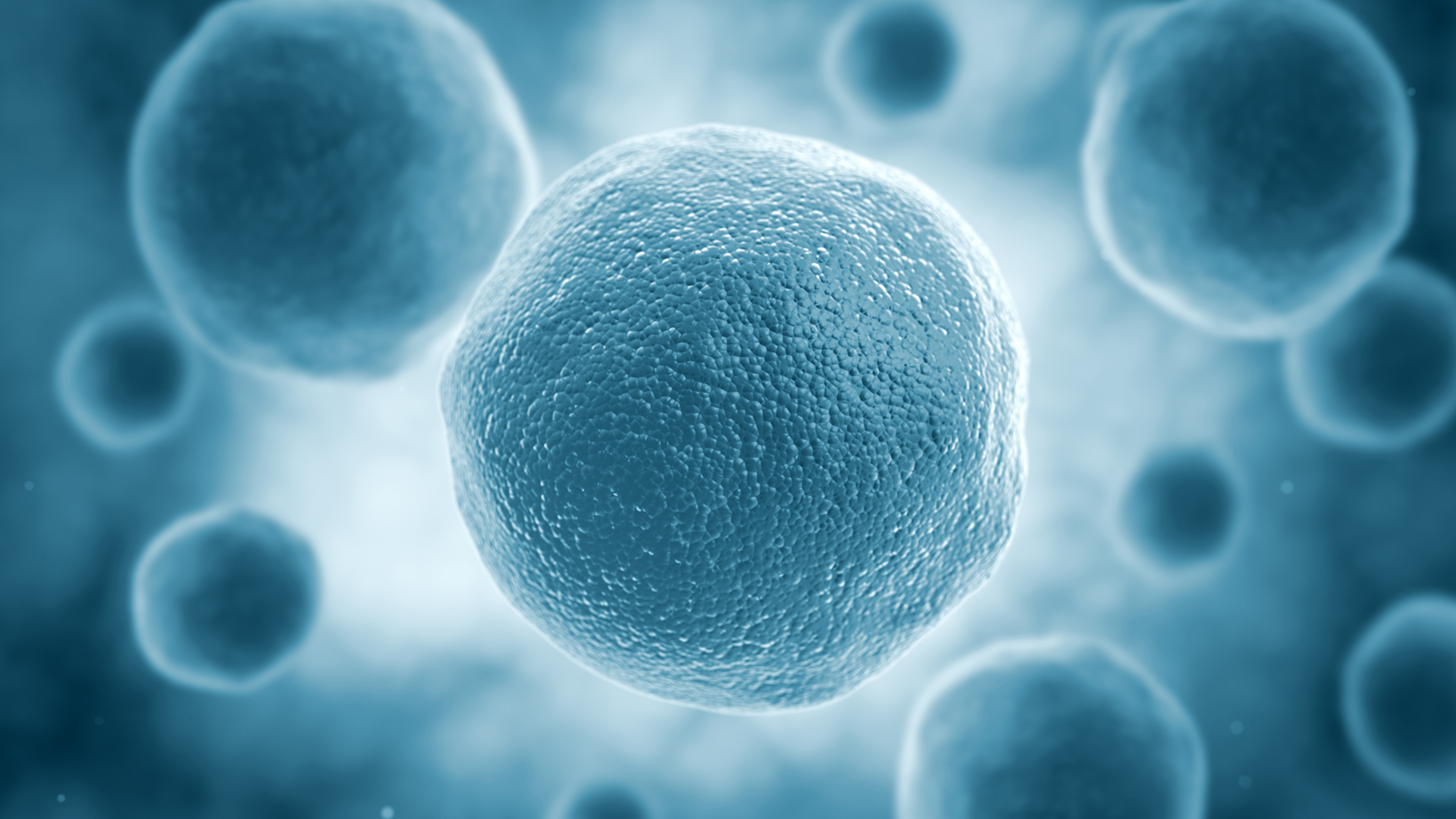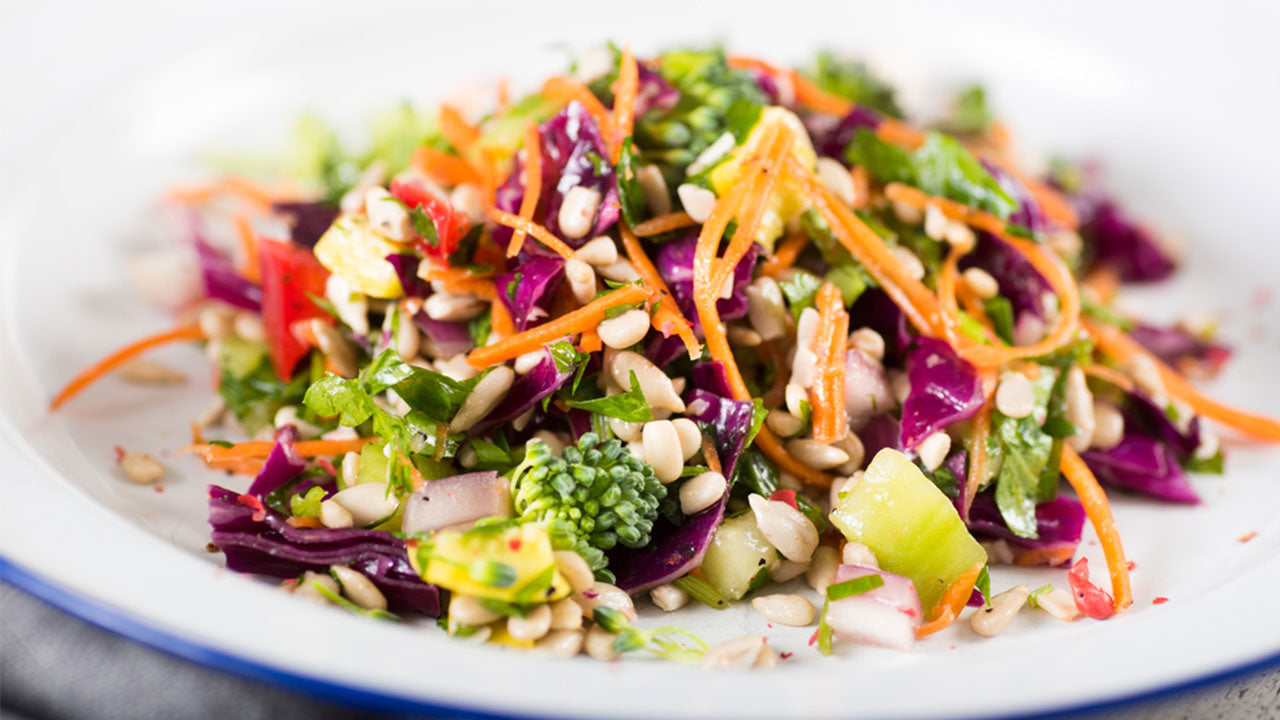The Potential Health Benefits of Pyrroloquinoline Quinone (PQQ)
 By: by Amino Science
By: by Amino Science

Pyrroloquinoline quinone (PQQ) is an aromatic tricyclic o-quinone that is not synthesized in mammals, including humans, or bacteria like Escherichia coli (E.coli). It is still found in our tissues due to its presence in soil and in some of our foods, which is how it makes its way into human breastmilk. You may be wondering if PQQ is friend or foe, poison or beneficial potion. We have the answers to those questions here.
What Is Pyrroloquinoline Quinone (PQQ)?
Pyrroloquinoline quinone, aka methoxatin, is a redox cofactor. Translation: it's a non-protein molecule that binds to enzymes and proteins to form a passageway for electron transfers in redox reactions. Redox reactions are oxidation-reduction reactions, essentially any chemical reaction in which a molecule, ion, or atom's oxidation number changes when it loses or gains an electron. Does that make it good or bad for you?
PQQ is good for us. In fact, PQQ as a nootropic has been shown to improve mitochondrial function and relieve age-related oxidative stress in aging mammals like rats. And PQQ supplementation may help boost the cell-signaling pathways associated with our mitochondria, which are responsible for energy metabolism in our bodies.
To better understand the role of PQQ, let's take a look at what happens when there's a deficiency. Animal studies reveal that a lack of PQQ leads to immune dysfunction, impaired growth, and abnormal reproductive performance, so while it's not currently classified as a vitamin by the United State Food and Drug Administration (FDA), dietary pyrroloquinoline quinone may deserve to be prioritized alongside the vitamins, amino acids, and essential minerals we're so careful to take daily.
The effects of PQQ supplementation are becoming more and more valued due to its neuroprotective abilities and antioxidant activities. Let's take a look at the studies proving these claims, plus advice on how to safely ingest PQQ supplements.

The Potential Health Benefits of Pyrroloquinoline Quinone
With vitamin-like effects as a coenzyme of quinoproteins, PQQ boosts redox cycling, which is mitochondrial energy production that gives us the adenosine triphosphate (ATP) we need to fuel our skeletal muscles for workouts and daily human functioning. While it's found in trace amounts in some foods (see a full list further down in this article), many find it to be more effectively absorbed from a single-dose supplement to gain the following benefits.
1. Enhanced Energy
When your mitochondria are operating at their fullest capacity, you're functioning like a well-oiled machine. Dietary PQQ helps cells perform spontaneous mitochondrial biogenesis, which is the synthesis of new living structures or organisms inside of a cell. By increasing the number of mitochondria our cells have, PQQ helps build the very engine that gives us energy each day and helps to control cellular metabolism so that we don't flag or feel fatigued when we need energy the most.
You may recall from high school biology that the mitochondria in cells are those big globs filled with wiggles, and are there to eat up any nearby cellular junk and turn otherwise wasted or disruptive material into usable energy. PQQ not only helps increase the amount of mitochondria and energize our bodies, but it also helps make those mitochondria more efficient. This leads to a significant boost in the energy levels of those who may otherwise experience chronic fatigue, as seen in this 2012 study in which participants with energy issues reported a notable decrease in fatigue levels after ingesting PQQ.
For anyone with a form of chronic fatigue, PQQ supplementation may offer relief.
2. Improved Sleep
The above-linked study from 2012 also focused on sleep in relation to fatigue and stress levels. A lack of proper sleep can lead to a weakened immune system, weight gain, lower sex drive, and an increased risk of certain medical conditions like type 2 diabetes and certain accidental injuries like car accidents. Participants reported improved levels of energy and experienced better sleep, perhaps because PQQ may reduce the amount of cortisol in the body, a stress hormone that leads to sleepless nights and sometimes grinding anxiety that can interfere with your enjoyment of life.
Long story short, PQQ is a biofactor that can produce positive impacts on your health in both physiological and psychological areas. While more research is needed for any real scientific consensus, PQQ is a water-soluble enzyme cofactor that may do well included in an evening nightcap of chamomile tea.
3. Neural Growth
This is a rather cursory benefit that is far from being proved out to any real degree of scientific certainty but still it's worth mentioning. One study from 1993 (recently republished in 2014) asserts that PQQ is a potent enhancer of nerve growth factor (NGF), which could lead to improved survival chances based on increased neuronal growth.
Some people supplement with NGF specifically to help regrow the dendrites and neurites in their brain, which may help contribute to improved cognition and signaling between neurons. By providing your brain with the supplies it needs to rejuvenate, you may help stave off age-related memory loss.
4. Fertility Aid
This is only the tip of the iceberg in the new and largely uninvestigated potential of pyrroloquinoline quinone, but a study from researchers Steinberg, Gershwin, and Rucker at the University of California discovered that PQQ stimulated neonatal growth in mice.
Not only did dietary PQQ help offspring survive, but those groups most deprived of PQQ had fewer pups per litter. As an animal study, this may not have much bearing on human fertility, but as PQQ is a natural part of our diet that we're worse off without, it may already be a contributing factor to our reproductive performance and our growth during critical developmental stages.
5. Memory Booster
Not only does PQQ have what some researchers note to be a "formidable free radical–scavenging capacity" as an antioxidant, but other scientists (Ohwada, Takeda, Yamazaki, Isogai, Nakano, Shimomura, Fukui, Urano at the Shibaura Institute of Technology in Japan) have found that PQQ may also help improve memory. To be clear, this testing was done using a combination of PQQ and CoQ10, another member of the coenzyme family known as ubiquinone, perhaps because it is ubiquitous among mammals and most bacteria. While many people supplementing consider PQQ and CoQ10 interchangeable, they may be more powerful together.
PQQ as a cofactor in several redox reactions has the capacity to scavenge reactive oxygen species and inhibit cell apoptosis, which stands for cell death. This promotes cognitive health and could make a real difference in preventing neurodegenerative conditions.
Pyrroloquinoline Quinone Foods
Before we go, let's check in on the nutritional status of PQQ and where it's found naturally in foods.
- Kiwis: Fuzzy on the outside and verdant on the inside, kiwis are a refreshing way to ingest PQQ.
- Papaya: This tropical fruit isn't green like so many other contenders on this list, but it still has a significant enough amount of PQQ to merit mention.
- Green peppers: Chop them up for a colorful stir-fry dish and know that there's a PQQ component to this fresh veggie.
- Parsley: More than just a decorative garnish, this leafy green has all the benefits of any other vegetable, plus natural traces of PQQ.
- Green and oolong tea: Shown scientifically to help improve human longevity across the board, green tea is made even more powerful thanks to its small helping of PQQ.
- Animal foods: Eggs and dairy products have fair amounts of PQQ as well.
If you want a more concentrated helping of PQQ, supplemental pyrroloquinoline quinone disodium salt can be found under the brand name BioPQQ. A small amount goes a very long way with this compound, so be sure to start small and don't disregard the dosing instructions on the packaging.
Mind Your Ps and Qs
PQQ is likely the nootropic you've never heard of, but as a natural trace substance quietly essential to some of the most central functions in our bodies like energy creation and brain function, PQQ deserves its spot in the limelight, so don't hesitate to explore its health benefits further and perhaps ask your doctor if it's right for you.
And if you're looking to refine your supplement regimen, consider adding essential amino acids to your daily intake. Our Active Aging formula helps prevent age-related heart and muscle decline that begins in your forties. Learn more here.

Up to 25% off Amino
Shop NowTAGS: supplements
Join the Community
Comments (0)
Most Craveable Recipes




 833-264-6620
833-264-6620



















